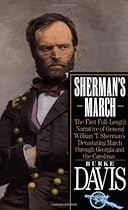The Rebel General Jackson
One of our greatest American generals and most comparable to Napoleon was Thomas “Stonewall” Jackson. Driven by an intense energy to defeat the enemies of their country, Jackson and his barefoot men were defending their farms, homes and families -- and fighting invading armies motivated by loot and conquest.
Bernhard Thuersam, Chairman
North Carolina War Between the States Sesquicentennial Commission
www.ncwbts150.com
"The Official Website of the North Carolina WBTS Sesquicentennial"
“The Rebel General Jackson”:
“AS a soldier [Stonewall] Jackson was famous for the rapidity of his movements. In the spring of 1862, when [Northern] General Banks, supposing that he was far from the [Shenandoah] Valley, sent a column of his army to attack the flank of General [Joseph E.] Johnston, then falling back from Manassas, and started himself to report to Washington -- Jackson suddenly wheeled, marched twenty-six miles the first day, and eighteen by ten o’clock the next morning, and struck at Kernstown a blow which brought back the column moving on Johnston’s flank and disconcerted McClellan’s whole plan of campaign.
A few weeks later, just as Banks had telegraphed Washington that the “rebel General Jackson was in full retreat on Gordonsville,” he appeared at McDowell, defeated Fremont’s advance under Milroy, joined [General Richard] Ewell at New Market, captured Front Royal, marched all night, and captured Winchester early next morning, and drove the remnants of Banks army across the Potomac before the Northern people were aware he was north of Staunton.
Learning that [Northern commanders] Shields and Fremont were endeavoring to form a junction in his rear, he marched his already broken-down troops thirty miles a day till he passed the point of danger, and then moved quietly up the Valley until at Cross Keys and Port Republic he suffered himself to be “caught,” and defeated in detail the two armies sent to “crush” him.
One of his biographers well puts it: “In thirty-two days he had marched nearly four hundred miles, skirmishing almost daily, fought five battles, defeated three armies, two of which were completely routed, captured about twenty pieces of artillery, some four thousand prisoners, and immense quantities of stores of all kinds, and had done all this with a loss of less than one thousand men, killed, wounded and missing.”
In his celebrated march to the rear of the braggart [General] Pope (who “knew no lines of retreat”) he made sixty miles in two days, and on various other occasions he made as good time. His mean rejoiced in the sobriquet of “Jackson’s foot cavalry,” and it was a glorious sight to witness the cheerful alacrity with which they responded to every call of their chief.”
(Stonewall Jackson, A Military Biography, John Esten Cooke, D. Appleton & Company, 1876, page 490)
From Free North Carolina
Bernhard Thuersam, Chairman
North Carolina War Between the States Sesquicentennial Commission
www.ncwbts150.com
"The Official Website of the North Carolina WBTS Sesquicentennial"
“The Rebel General Jackson”:
“AS a soldier [Stonewall] Jackson was famous for the rapidity of his movements. In the spring of 1862, when [Northern] General Banks, supposing that he was far from the [Shenandoah] Valley, sent a column of his army to attack the flank of General [Joseph E.] Johnston, then falling back from Manassas, and started himself to report to Washington -- Jackson suddenly wheeled, marched twenty-six miles the first day, and eighteen by ten o’clock the next morning, and struck at Kernstown a blow which brought back the column moving on Johnston’s flank and disconcerted McClellan’s whole plan of campaign.
A few weeks later, just as Banks had telegraphed Washington that the “rebel General Jackson was in full retreat on Gordonsville,” he appeared at McDowell, defeated Fremont’s advance under Milroy, joined [General Richard] Ewell at New Market, captured Front Royal, marched all night, and captured Winchester early next morning, and drove the remnants of Banks army across the Potomac before the Northern people were aware he was north of Staunton.
Learning that [Northern commanders] Shields and Fremont were endeavoring to form a junction in his rear, he marched his already broken-down troops thirty miles a day till he passed the point of danger, and then moved quietly up the Valley until at Cross Keys and Port Republic he suffered himself to be “caught,” and defeated in detail the two armies sent to “crush” him.
One of his biographers well puts it: “In thirty-two days he had marched nearly four hundred miles, skirmishing almost daily, fought five battles, defeated three armies, two of which were completely routed, captured about twenty pieces of artillery, some four thousand prisoners, and immense quantities of stores of all kinds, and had done all this with a loss of less than one thousand men, killed, wounded and missing.”
In his celebrated march to the rear of the braggart [General] Pope (who “knew no lines of retreat”) he made sixty miles in two days, and on various other occasions he made as good time. His mean rejoiced in the sobriquet of “Jackson’s foot cavalry,” and it was a glorious sight to witness the cheerful alacrity with which they responded to every call of their chief.”
(Stonewall Jackson, A Military Biography, John Esten Cooke, D. Appleton & Company, 1876, page 490)
From Free North Carolina













0 Comments:
Post a Comment
Subscribe to Post Comments [Atom]
<< Home